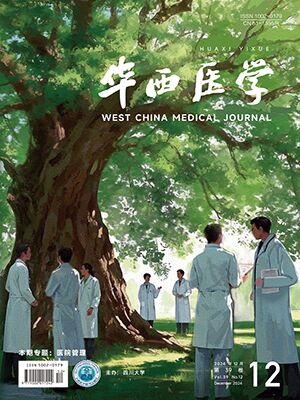摘要:目的:研究成都地区中老年人群体重指数(BMI)与高血压患病率及血压水平的关系。方法:按照随机抽样的方法抽取样本,对711人(平均年龄为63.28±6.25岁;男性占57.8%)进行了相关调查,调查内容中包括身高、体重、血压及脉搏等。结果:成都地区中老年人群的超重及肥胖所占比重较大(约45%),按BMI分组( lt;18.5 kg/m2,18.5~23.9 kg/m2,24~27.9 kg/m2,≥28.0 kg/m2)的高血压患病率分别是31.6%,54.8%,64.4%,82.8%,差异有统计学意义。采用logistic回归分析发现在调整年龄、性别、腰围及尿酸等后,BMI对高血压的患病率有独立影响。在整个人群及女性病人中,血压随着BMI的升高而有升高的趋势,差异有统计学意义。结论:成都地区中老年人群超重及肥胖所占比重较大。BMI可以影响高血压的患病率及影响女性病人的血压水平,是高血压的独立危险因素。
Abstract: Objective: To investigate the effects of body mass index on prevalence of hypertension and blood pressure in the elderly. MethodsA survey, including height, weight, blood pressure and pulse, was carried out in a general population of Chengdu. A total of 711 subjects (average age: 63.28±6.25 years; male: 57.8%) were recruited by random sampling method. Results:The proportion of overweight and obesity was about 45%. The hypertension prevalence rate was significantly positively correlated with BMI (P lt;0.01), and that was also seen in the level of SBP and DBP for the female (P lt;0.05). In logistic regression analysis adjusting for age, gender, waist, uric acid, the standardized OR for higher BMI (≥28.0 kg/m2) as a risk factor of hypertension was 5.140. Conclusion:The proportion of overweight and obesity was great in Chengdu area. BMI can affect the prevalence rate of hypertension and the level of blood pressure.
Citation: HE Sen,CHEN Xiao ping,JIANG Lingyun,et al.. Effects of Body Mass Index on Prevalence of Hypertension and Blood Pressure in the Elderly. West China Medical Journal, 2009, 24(11): 2823-2825. doi: Copy
Copyright © the editorial department of West China Medical Journal of West China Medical Publisher. All rights reserved




